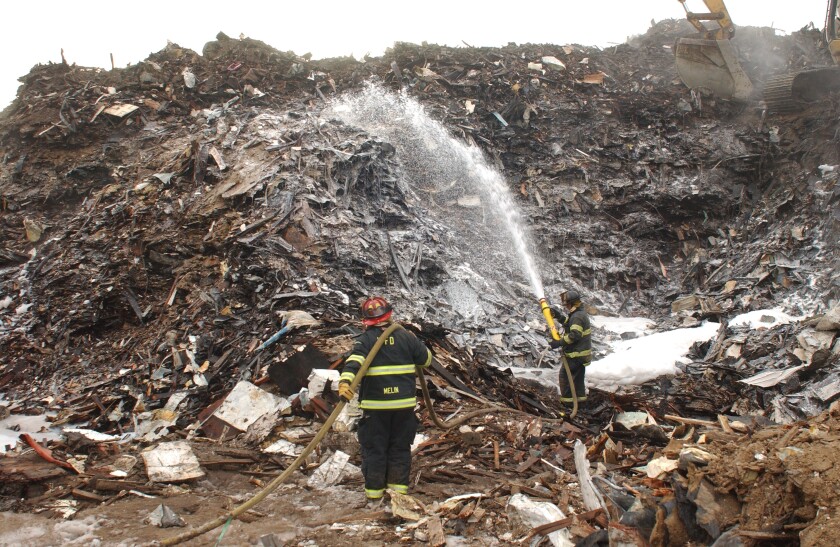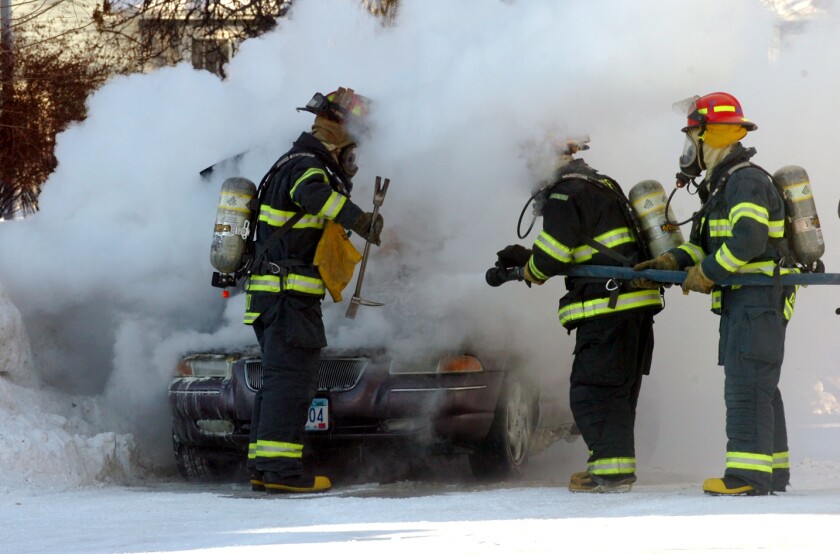WILLMAR — A firefighter’s job is never easy. It can be difficult, dangerous and heartbreaking. It can also be amazing, hopeful, and wonderful when everyone is safe and healthy at the end of a call. For firefighters, however, the hazards of the job, whether it be physical ailment or mental scarring, continue long after the last fire.
“There’s a moral imperative to firefighting. People expect us to put ourselves in harm’s way, to do what we do. That’s part of the job,” said Wayne Kewitsch, executive director of the Minnesota Firefighters Initiative. “That doesn’t mean we can’t try to mitigate and minimize the hazards that we’re exposed to, so that we can live a long and healthy life.”
Last summer, the Minnesota Fire Initiative, commonly called MnFIRE, brought the
Hometown Heroes Assistance Program
approved by the state Legislature. The bill provides $4 million per year this biennium to provide all firefighters in the state of Minnesota with access to physical and mental health care. It was a three-year effort to get it passed, but now the program is in its first year.
“It’s been a big push over the last couple of months, getting it approved and then getting everything up and running,” Kewitsch said.
Hometown Heroes is focused on providing help to firefighters in need, whether they are dealing with cancer or need advice dealing with some of the horrible things they have seen or experienced. Hometown Heroes includes both the Critical Illness Program and the MnFIRE Assistance Program which can assist firefighters in both.
West Central Tribune file photo
When a building catches fire, there is no way of knowing what kinds of chemicals or hazardous agents are floating in the air along with the smoke or covering the debris that remains. Fewer natural materials are used in modern buildings than in decades past, which can expose a firefighter to many carcinogenic materials as well as more dangerous fires, Kewitsch said. Firefighters are also at risk of sudden cardiac events such as heart attacks, which can be triggered by carbon monoxide, particulate matter in smoke, as well as increased heart rate and extreme physical exertion.
The Critical Illness Program provides firefighters facing a critical illness like cancer or heart problems with up to $20,000 in cash assistance to help with expenses like lodging while receiving treatment or paying bills while out of work.
“We’ve already paid three claims and have two dozen more in process,” Kewitsch said. “I get a call every week from a firefighter who has been diagnosed with cancer or a heart problem.”
West Central Tribune file photo
The MnFIRE Assistance Program provides trained counselors, either by phone or online, at any time of the day or night for firefighters and their immediate families. They can also use trained peer support and speak with another firefighter.
“A firefighter can talk to a fellow firefighter who has had those experiences, understands the job and has been trained to guide that person through the crisis or their issues,” Kewitsch said.
Training is a big part of Hometown Heroes. Fire departments receive a curriculum on the assistance programs available to firefighters, as well as instruction on the occupational hazards they take while on the job.
“I look at it as a workout that’s no different than putting on the air pack,” Kewitsch said.
Health professionals are also trained to be more aware of the health risks to which firefighters are exposed. This can help them when treating a firefighter and when planning prevention, diagnosis, and treatment.
“They don’t understand what firefighters are exposed to, that they need to be tested at a younger age,” Kewitsch said.
West Central Tribune file photo
While lawmakers approved only two years of funding for Hometown Heroes, Kewitsch hopes the state will continue to fund the program for years to come. According to a study by
Minnesota Center for Tax Excellence
In 2018, Minnesota ranked 47th in the nation for fire protection spending per household at $237. There is definitely a need for this program and its funding, Kewitsch believes.
“It’s your neighbors, your friends, your family. They go out in the middle of the night, in freezing minus 30 degree winds to help someone in need. Then they come back to the station, clean up and go to work for the day.” , Kewtisch said, and they need this help, even if it’s hard for them to ask for it.
MnFIRE hopes to change the dialogue and stigma around asking for help, no matter the reason or cause, to help those who need it. The overall goal of Hometown Heroes is to keep Minnesota’s firefighters safe and healthy, even when they’re away from the flames.
“Our goal is that 20 years from now we don’t have any firefighter suicides, that the cancer rate of firefighters is the same for the general public,” Kewitsch said. “That is our goal.”
window.fbAsyncInit = function() {
FB.init({
appId : ‘1155092205298742’,
xfbml : true,
version : ‘v2.9’
});
};
(function(d, s, id){
var js, fjs = d.getElementsByTagName(s)[0];
if (d.getElementById(id)) {return;}
js = d.createElement(s); js.id = id;
js.src = “https://connect.facebook.net/en_US/sdk.js”;
fjs.parentNode.insertBefore(js, fjs);
}(document, ‘script’, ‘facebook-jssdk’));


